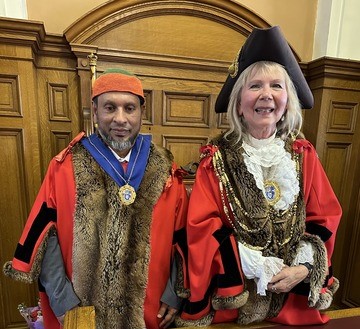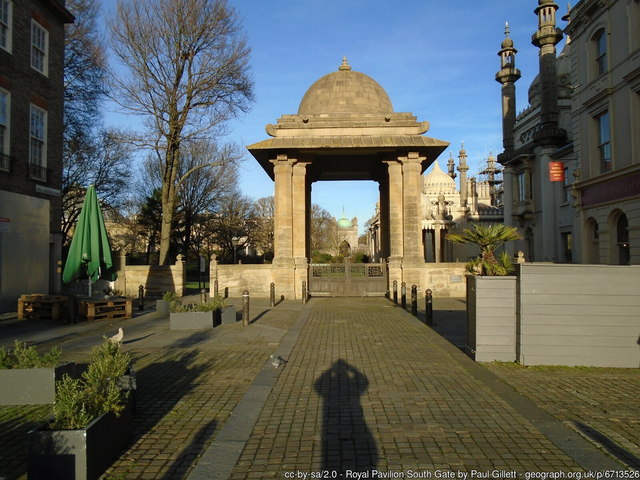A new multi-faith event to commemorate the role of soldiers from pre-partition India won the backing of councillors today (Thursday 18 April).
The event will be put together by Brighton and Hove City Council in collaboration with the Royal Pavilion and Museums Trust at the India Gate on or around Saturday 26 October 2024.
Members of the council’s Culture, Heritage, Sport, Tourism and Economic Development Committee unanimously backed the idea.
They voted to set up a committee of community leaders chaired by the current deputy mayor, Labour councillor Mohammed Asaduzzaman, to oversee the event and secure funding for future years.
The move is in response to a motion proposed by Labour councillor Birgit Miller at a meeting last November.
She wanted to recognise the significant role of soldiers from undivided India, before the 1947 partition, and from the wider region in ensuring victory in the First and Second World Wars.
Today, Councillor Miller said: “It is very important for the city and it’s very important for the country that we recognise all Commonwealth soldiers.
“I’m from a Commonwealth country and I can see the difference in recognition for Canadian soldiers and from soldiers from Asia, Africa, all the rest of the Commonwealth. There is a real difference.
“We can be that council that starts to change that conversation so I’m very proud that we are moving forward with this.”
Green councillor Raphael Hill described the commemoration as a “good use” of council time to bring people together at a time of division.
Councillor Hill said: “It’s important, particularly right now, to bring forward these multi-faith events.
“I know a lot of people here attended Iftar recently. Working with groups like the Dialogue Society that runs the annual Iftar might be a way to ensure the continuation of this annual multi-faith event as they have a lot of experience of running this sort of thing.”
Labour councillor Alan Robins, who chairs the committee and who is also a Royal Pavilion trustee, said that it was important to remember the whole history of the Pavilion beyond its time in the 1820s when it was King George IV’s palace.
Councillor Robins said: “There is so much more to the story of the Pavilion and the Pavilion Gardens and the India Gate.
“It’s great we are starting to see that and tell the story. I’ve lived in Brighton my entire life and it wasn’t a story we learned in school.”
The India Gate was a gift to the city from the “princes and people of India” and was unveiled by the Maharajah of Patiala on Wednesday 26 October 1921.
The Royal Pavilion was one of three buildings in Brighton used to house soldiers from undivided India and served as the base hospital.
During the First World Ward 1.5 million soldiers from India, Pakistan, Bangladesh, Nepal, Bhutan and Myanmar (Burma) fought in the trenches.

From 1914 to 1916, 12,000 of those soldiers were treated in Brighton – more than 4,000 of them at the Royal Pavilion.
The Chattri memorial, on the Downs just north of Brighton, commemorates 53 Hindu and Sikh soldiers who were cremated there.
In the Second World War more than 2.5 million men from undivided India volunteered to serve in the British Indian army.
Consultation is expected to involve local armed forces personnel, the Undivided India Ex-Services Association, a retired teacher, Davinder Dhillon, who has organised the annual Chattri remembrance service for many years, and the wider South Asian community.
The proposed multi-faith element is intended to recognise and involve the diverse religious communities from the sub-continent including Hindus, Sikhs, Buddhists, Muslims, Jains, Christians, Jews, Zoroastrians and those of other religions.










Very worthy, but hardly worth wasting most of a precious committee meeting with a ridiculously wide remit discussing what they all agreed was a good idea in the first place! This sounds like virtue signal filibustering to use up the time which should have been devoted to discussing other issues affecting the city.
There were 5 items for decision on the agenda for the meeting yesterday. Including a report on spending s106 money (somethign you’ve shown an interest in the past and demanding information on how it’s spent!).
What basis do you have for saying ‘most’ of the meeting was taken up with discussing this?
I guess you’re now happy for a Cabinet member to just make this decsion and I though you aere against that change to the councils constitution..
One of the questions was from Councillor Bridget FIshleigh asking if there had been any marketing/business plan activities regarding the £540m Blackrock project since 2021. There had not and the chair seemed anxious to move on offering to meet her ‘outside the committee’ to discuss. Nor did he wish to discuss the King Alfred leisure centre, despite intending to make a gamechanging decision about its future very soon. Major topics were shut down with no debate, but they had all the time in the world to discuss a new annual multifaith festival – another bill to be footed by the taxpayers.
Cllr Fishleigh is entitled to ask questsions under the ‘member involvement’ part of the agenda. Just as members of the public are. Why not try it sometime?
The rules of which are listed in the agenda paper for that particular item
https://democracy.brighton-hove.gov.uk/documents/s198120/Member%20Questions.pdf
“The question will be answered without discussion. The person who asked the question may ask one relevant supplementary question, which shall be put and answered without discussion. The person to whom a question, or supplementary question, has been put may decline to answer it.”
It is a perfectly valid answer from the chair to offer to meet with her outside of the meeting. Where she would be able to ask more questions than permitted under the councils constitution and committee rules.
There is no free debate on members questions,
Re the King Alfred. Was it on the Agenda? No it wasn’t.
Only items on the publshed agenda can be discussed at meetings. There is no ‘Any other Business’ at council meetings because public notice has to be given.
That’s the law of the land and applies to all councils.
I don’t know which of the 5 agenda items for decisions were actually discssed at the meeting other than the Indian Commerations.
But all councils have a ‘call over’ procedure at the start of meetings where agenda items are read out at the start and members indicate whether they wish to discuss them or just accept the officer recommendations without debate. If no member indicates they want to discuss it then there isn’t any discussion. Again all perfectly legal.